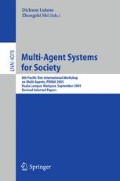Abstract
This paper discusses the need to incorporate the notion of active perception in intelligent agent systems. There are two justifications for this proposition. First, we believe perception should receive more attention and some special treatment. Perception is the most direct and effective way to update an agent’s beliefs about the status of its environment. In theory, an overwhelming portion of an agent’s decisions about its next course of action, or next actions, in either the reactive or deliberative model, should be heavily influenced by what is happening in the environment – this is one of the important characteristics that differentiates agents from the traditional software design paradigm. An agent’s internal activities, such as deliberation and means-end analysis, to a large extent, are also driven by what have been sensed. The second justification is that active perception plays an imperative role in situation awareness. Active perception is an important capability that directs an agent’s limited attention to the relevant aspects of the environment in an proactive manner.
Access this chapter
Tax calculation will be finalised at checkout
Purchases are for personal use only
Preview
Unable to display preview. Download preview PDF.
References
Broadbent, D.: Perception and communication. Oxford University Press, Oxford (1958)
Broadbent, D.: Decision and stress. Academic Press, London (1971)
Chrisman, L., Simmons, R.: Sensible planning: Focusing perceptual attention. In: The Ninth National Conference on Artificial Intelligence (AAAI) (1991)
Durso, F.T., Gronlund, S.D.: Situation awareness. In: Handbook of Applied Cognition, pp. 283–305. John Wiley and Sons, Chichester (1999)
Endsley, M.R.: Toward a theory of situation awareness in dynamic systems. Human Factors 37(1), 32–64 (1995)
Endsley, M.R.: Theoretical underpinnings of situation awareness: A critical review. In: Endsley, M.R., Garland, D.J. (eds.) Situation Awareness Analysis and Measurement, pp. 3–32. Lawrence Erlbaum Associates, Mahwah (2000)
Endsley, M.R., Bolte, B., Jones, D.G.: Designing for Situation Awareness: An Approach to User-Centered Design. Taylor and Francis, Abington (2003)
Endsley, M.R., Sollenberger, R., Stein, E.: The use of predictive displays for aiding controller situation awareness. In: Proceedings of the 43rd Annual Meeting of the Human Factors and Ergonomics Society (1999)
Heinze, C.: Modelling Intention Recognition for Intelligent Agent Systems. PhD thesis, The University of Melbourne (2003)
Kinny, D., Georgeff, M., Hendler, J.: Experiment in optimal sensing for situated agents. In: The Second Pacific Rim International Conference on Artificial Intelligence, PRICAI 1992, Seoul, Korea (1992)
Kowalski, R.: Database updates in the event calculus. The Journal of Logic Programming 12, 121–146 (1992)
Kowalski, R., Sergot, M.: A logic-based calculus of events. New Generation Computing 4, 67–95 (1986)
Scherl, R., Levesque, H.: The frame problem and knowledge-producing actions. In: The Eleventh National Conference on Artificial Intelligence (AAAI 1993). AAAI Press, Menlo Park (1993)
Schut, M., Wooldridge, M.: Principles of intention reconsideration. In: Muller, J.P., Andre, E., Sen, S., Frasson, C. (eds.) The Fifth International Conference on Autonomous Agents, pp. 340–347. ACM Press, New York (2001)
Schut, M., Wooldridge, M., Parsons, S.: The theory and practice of intention reconsideration. Journal of Experimental and Theoretical Artificial Intelligence 16(4), 261–293 (2004)
Shanahan, M.: The event calculus explained. In: Veloso, M.M., Wooldridge, M.J. (eds.) Artificial Intelligence Today. LNCS (LNAI), vol. 1600, pp. 409–430. Springer, Heidelberg (1999)
Shanahan, M.: Perception as abduction: Turning sensor data into meaningful representation. Cognitive Science 29, 103–134 (2005)
So, R., Sonenberg, L.: Agents with initiative: A preliminary report. In: Nickles, M., Rovatsos, M., Weiss, G. (eds.) AUTONOMY 2003. LNCS, vol. 2969, pp. 237–248. Springer, Heidelberg (2004)
So, R., Sonenberg, L.: Situation awareness in intelligent agents: Foundations for a theory of proactive agent behavior. In: IEEE/WIC/ACM International Conference on Intelligent Agent Technology (IAT 2004), Beijing, China, pp. 86–92. IEEE Computer Society Press, Los Alamitos (2004)
Weyns, D., Steegmans, E., Holvoet, T.: Towards active perception in situated multi-agent systems. Applied Artificial Intelligence 18, 867–883 (2004)
Wooldridge, M.: Reasoning about rational agents. MIT Press, Cambridge (2000)
Wooldridge, M.: An Introduction to MultiAgent Systems. John Wiley and Sons Press, England (2002)
Author information
Authors and Affiliations
Editor information
Editors and Affiliations
Rights and permissions
Copyright information
© 2009 Springer-Verlag Berlin Heidelberg
About this paper
Cite this paper
So, R., Sonenberg, L. (2009). The Roles of Active Perception in Intelligent Agent Systems. In: Lukose, D., Shi, Z. (eds) Multi-Agent Systems for Society. PRIMA 2005. Lecture Notes in Computer Science(), vol 4078. Springer, Berlin, Heidelberg. https://doi.org/10.1007/978-3-642-03339-1_12
Download citation
DOI: https://doi.org/10.1007/978-3-642-03339-1_12
Publisher Name: Springer, Berlin, Heidelberg
Print ISBN: 978-3-642-03337-7
Online ISBN: 978-3-642-03339-1
eBook Packages: Computer ScienceComputer Science (R0)

